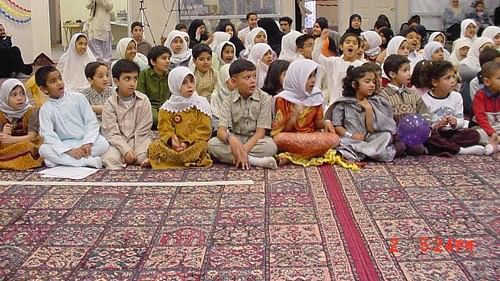
A madrassa class. Representative image.
DH File Photo
New Delhi: The NCPCR has said that several state governments did not respond or were reluctant to carry out its direction to map all madrassas in their states, which it says is “an institutional violation of fundamental rights”.
While Karnataka, too, had not carried out the exercise, the Commission has found that the state has 406 residential madrasas where 19,307 students are admitted, including 14,281 residential students. Apart from that, the state also has 1,250 non-residential madrasas with 92,903 children in them. Most of the children (89,619) are receiving a formal education.
The child rights body, which had drafted a report titled 'Guardians of Faith or Oppressors of Rights: Constitutional Rights of Children vs Madrasas', had asked the states to carry out the mapping while carrying out studies for the report.
In the report, the Commission has asked all states to close madrasas, stop funding them and ensure no non-Muslim children are enrolled in them. The Commission says that madrassa education is violative of Articles 29 and 30 of the Indian Constitution, as well as the Right to Education (RTE) Act 2009. The Commission has also asked Unified District Information System for Education Plus (UDISE) Code.
The Commission, in its report, said that there is an absence of any data source in the country of unrecognised madrassas. “Consequently, what kind of curriculum is followed in these institutions … the information on the environment these institutions provide to children also remains unknown. This is also evident in the numerous complaints that NCPCR receive regarding neglect, ill-treatment, corporal punishment and sexual abuse of children. Children attending all such institutions (unrecognised and/or unmapped madrasas) are treated as Out of School, even if they provide regular education,” the Commission said in its report.
While data from the UDISE data shows that there are 19,965 recognised madrasa and 4037 unrecognised madrasas in the country, a response to a Parliamentary question showed that the enrolment for recognised madrasas is 26,93,588 and 5,40,744 for unrecognised madrasas.
“That means the average enrollment per recognised madrasa is 137 and per unrecognised Madrasa is 134. Based on the estimation of 1.1 crore muslim children that are out-of-school and attending Madrasas, there could be more than 80000 unmapped madrasas in the country, attended to by children but being virtually missing from the education picture of the country,” the report states. In addition, as per the information shared by the States, there are around 11,000 non-Muslim children attending Madrasas in states with madrassa boards.
To this end, the NCPCR had written to Chief Secretaries of all states andUTs asking them to conduct a detailed inquiry of all government-funded and recognised Madrasas who have non-Muslim children attending classes, as well as undertake a mapping of all unmapped madrasas and then admit the children enrolled in them into Schools for availing formal education.
Among other BJP-ruled states, the Assam government has dissolved the State Madrasa Education Board banning recognised madrassas, while the unrecognised one continued to function, the Commission’s report states. Gujarat was among the few states that conducted a mapping and while it does not have any recognised or funded madrassa, state officials identified 1315 madrassas where 80494 children are attending, of which, 73119 children are admitted in formal schools.
West Bengal, in reply to the Commission’s directive, said that since Article 29 (2) of the Constitution of India has given the right to every individual to take admission in any educational institution of their choice, there shall be no discrimination on the grounds of religion, race or caste.